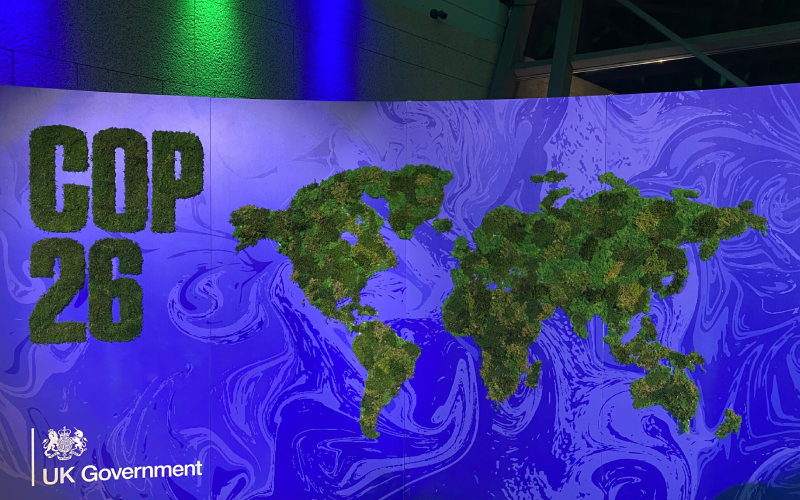You are here
- Home
- Playing for the planet
Playing for the planet

COP26 has been bringing together parties from across the world to accelerate action towards the goals of the Paris Agreement and the UN Framework Convention on Climate Change. The Open University has official observer status at COP26 and is learning from the conference to inform the university’s wider sustainability mission and inspire students and staff to take action. Here are some of the conference’s highlights, as told by our Open University observers.
COP26 Diary - 2 November: Graeme Smith, Team Manager in Student Recruitment and Support.
The COP has three main areas: the inner 'blue zone' where all the negotiations happen, a 'green zone' which is accessible to all 'blue zone' pass holders and this year is organised by the UK Cabinet Office and the fringe events outside the official process. A tactically-timed visit to the 'green zone' avoided the lengthy 'blue zone' queues and introduced me to a more informal, museum-like vibe, seemingly designed to appeal to the younger generation. There are pre-bookable, scheduled events which are also live-streamed. The OU has a 'green zone' event on Sunday 7 November at 1:00pm. There are lots of interactive games, puzzles and quizzes. Given the amount of school trips and younger people around, it's a smart move to encourage knowledge-building and passion.
A standout for me was a stall showcasing Playing for the Planet – an organisation facilitated by the UN Environment Programme and comprised of some of the biggest video game companies in the world (Sony, Xbox, Ubisoft to name but a few) with the aim of integrating climate-based issues into their video games and 'supporting the global environmental agenda through initiatives ranging from planting millions of trees to reducing plastic in their products.' For example, Minecraft released a special called The City of Hope, where the city is used to help players envisage a zero-emissions future. Funds raised from this part of the game helped to plant 150,000 trees in East Africa. My love of gaming may make me a bit biased here, however the potential benefits seem vast since 2.3 billion people play games worldwide and the demographic of the gaming community is generally younger. Because video gaming turns over more money than Hollywood, Bollywood and the entire music industry combined, the economic backing is there.
The rest of the day was spent wandering the pavilions and listening to events. The U.S. Center hosted an event with Samantha Power of USAID in which they discussed adaptability within the 30 least-developed countries most affected by climate change. I also attended Accelerating the Just Water Transition at the Water Pavillion and had an enlightening discussions.
Related articles
- Supporting climate action through digital education: new free BOC 26th February 2024
- Introducing a new free course - Climate Psychology: facing the climate crisis 8th February 2024
- Climate Change and machine learning - Climate Perspectives 8th February 2024
- Go Green: What is eco-anxiety? 8th February 2024
- Go Green: Fashion Fixing and Mending 8th February 2024